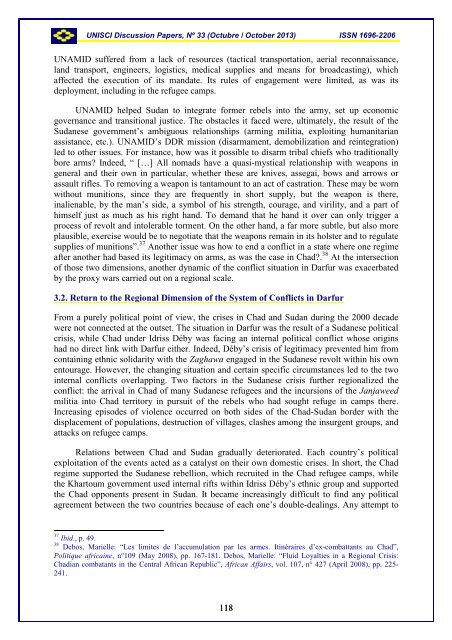UNISCI - Universidad Complutense de Madrid
UNISCI - Universidad Complutense de Madrid
UNISCI - Universidad Complutense de Madrid
You also want an ePaper? Increase the reach of your titles
YUMPU automatically turns print PDFs into web optimized ePapers that Google loves.
<strong>UNISCI</strong> Discussion Papers, Nº 33 (Octubre / October 2013) ISSN 1696-2206UNAMID suffered from a lack of resources (tactical transportation, aerial reconnaissance,land transport, engineers, logistics, medical supplies and means for broadcasting), whichaffected the execution of its mandate. Its rules of engagement were limited, as was its<strong>de</strong>ployment, including in the refugee camps.UNAMID helped Sudan to integrate former rebels into the army, set up economicgovernance and transitional justice. The obstacles it faced were, ultimately, the result of theSudanese government’s ambiguous relationships (arming militia, exploiting humanitarianassistance, etc.). UNAMID’s DDR mission (disarmament, <strong>de</strong>mobilization and reintegration)led to other issues. For instance, how was it possible to disarm tribal chiefs who traditionallybore arms? In<strong>de</strong>ed, “ […] All nomads have a quasi-mystical relationship with weapons ingeneral and their own in particular, whether these are knives, assegai, bows and arrows orassault rifles. To removing a weapon is tantamount to an act of castration. These may be wornwithout munitions, since they are frequently in short supply, but the weapon is there,inalienable, by the man’s si<strong>de</strong>, a symbol of his strength, courage, and virility, and a part ofhimself just as much as his right hand. To <strong>de</strong>mand that he hand it over can only trigger aprocess of revolt and intolerable torment. On the other hand, a far more subtle, but also moreplausible, exercise would be to negotiate that the weapons remain in its holster and to regulatesupplies of munitions”. 37 Another issue was how to end a conflict in a state where one regimeafter another had based its legitimacy on arms, as was the case in Chad?. 38 At the intersectionof those two dimensions, another dynamic of the conflict situation in Darfur was exacerbatedby the proxy wars carried out on a regional scale.3.2. Return to the Regional Dimension of the System of Conflicts in DarfurFrom a purely political point of view, the crises in Chad and Sudan during the 2000 <strong>de</strong>ca<strong>de</strong>were not connected at the outset. The situation in Darfur was the result of a Sudanese politicalcrisis, while Chad un<strong>de</strong>r Idriss Déby was facing an internal political conflict whose originshad no direct link with Darfur either. In<strong>de</strong>ed, Déby’s crisis of legitimacy prevented him fromcontaining ethnic solidarity with the Zaghawa engaged in the Sudanese revolt within his ownentourage. However, the changing situation and certain specific circumstances led to the twointernal conflicts overlapping. Two factors in the Sudanese crisis further regionalized theconflict: the arrival in Chad of many Sudanese refugees and the incursions of the Janjaweedmilitia into Chad territory in pursuit of the rebels who had sought refuge in camps there.Increasing episo<strong>de</strong>s of violence occurred on both si<strong>de</strong>s of the Chad-Sudan bor<strong>de</strong>r with thedisplacement of populations, <strong>de</strong>struction of villages, clashes among the insurgent groups, andattacks on refugee camps.Relations between Chad and Sudan gradually <strong>de</strong>teriorated. Each country’s politicalexploitation of the events acted as a catalyst on their own domestic crises. In short, the Chadregime supported the Sudanese rebellion, which recruited in the Chad refugee camps, whilethe Khartoum government used internal rifts within Idriss Déby’s ethnic group and supportedthe Chad opponents present in Sudan. It became increasingly difficult to find any politicalagreement between the two countries because of each one’s double-<strong>de</strong>alings. Any attempt to37 Ibid., p. 49.38 Debos, Marielle: “Les limites <strong>de</strong> l’accumulation par les armes. Itinéraires d’ex-combattants au Chad”,Politique africaine, n°109 (May 2008), pp. 167-181. Debos, Marielle: “Fluid Loyalties in a Regional Crisis:Chadian combatants in the Central African Republic”, African Affairs, vol. 107, n° 427 (April 2008), pp. 225-241.118
















